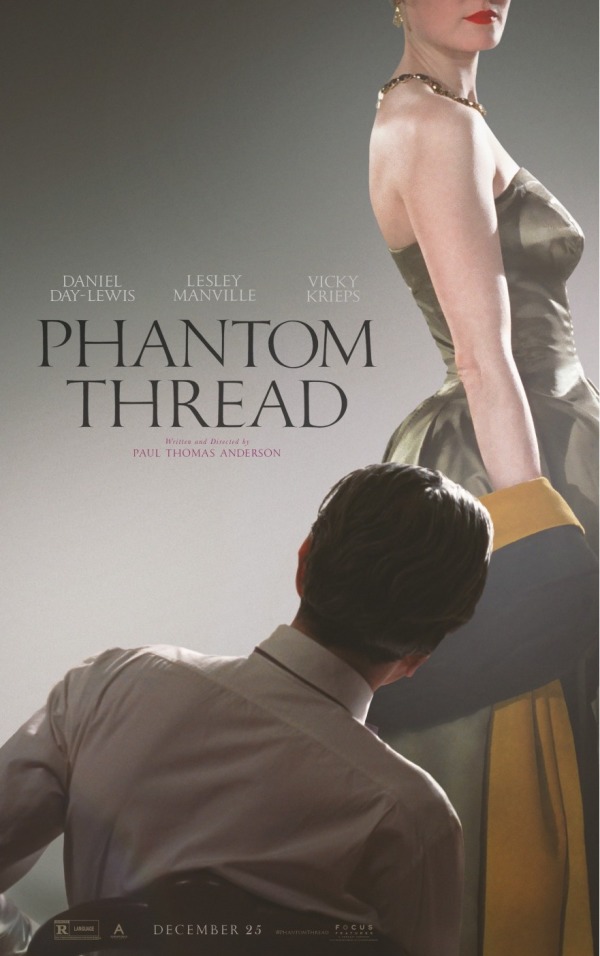THE PHANTOM THREAD (dir. by Paul Thomas Anderson, 130 min., USA, 2018)
![]() BY DAN TABOR FILM CRITIC After more or less going dark for three years, Paul Thomas Anderson returns to the silver screen with Phantom Thread, his follow up to 2014’s Inherent Vice, which reunites him with Daniel Day-Lewis for what reportedly will be the famously enigmatic actor’s final film role. Much like The Master, Phantom Thread is an evocative exploration of the ever-shifting power dynamics of dysfunctional relationships in Post-War period dress. But in stark contrast to sprawling American epics like There Will Be Blood and The Master, Phantom is a much more up-close-and-personal affair, showcasing the mesmerizing big screen magnetism that makes Day-Lewis one of the most arresting and intensely-committed actors of the last 40 years. And like its star, it is quintessentially, indelibly English: drafty, prim and cobblestoned.
BY DAN TABOR FILM CRITIC After more or less going dark for three years, Paul Thomas Anderson returns to the silver screen with Phantom Thread, his follow up to 2014’s Inherent Vice, which reunites him with Daniel Day-Lewis for what reportedly will be the famously enigmatic actor’s final film role. Much like The Master, Phantom Thread is an evocative exploration of the ever-shifting power dynamics of dysfunctional relationships in Post-War period dress. But in stark contrast to sprawling American epics like There Will Be Blood and The Master, Phantom is a much more up-close-and-personal affair, showcasing the mesmerizing big screen magnetism that makes Day-Lewis one of the most arresting and intensely-committed actors of the last 40 years. And like its star, it is quintessentially, indelibly English: drafty, prim and cobblestoned.
Set in post-World War II London’s Haute Couture fashion scene, Phantom stars Daniel Day-Lewis as the illustrious dressmaker and confirmed bachelor Reynolds Woodcock, who along with his sister Cyril (Lesley Manville) run the House of Woodcock. Responsible for dressing royals, film stars, heiresses and boozy socialites, Reynolds is constantly on the lookout for a new muse/model/live-in GF to inspire and inhabit his lavish creations. When the film begins Reynolds has just parted ways with his latest companion and makes fast work of finding a replacement in the mousy, decades-younger waitress Alma (Vicky Krieps). After ordering a hearty breakfast that could easily feed a small family, Reynolds earns the pet name “Hungry Boy” on his first date with the young woman, who, we will soon learn, isn’t quite as meek as she lets on. As Alma is swept into Reynolds’ fussy orbit, she quickly proves herself a force to be reckoned and over time her willful refusal to be subsumed by the House of Woodcock begins to tear at the seams of Reynolds’ meticulously-curated life.
Jonny Greenwood’s exquisite score animates this dance of wills, the furies and the languors, all of which is rendered indelible by Paul Thomas Anderson’s breathtakingly gorgeous cinematography. For Phantom, Anderson returns to the 70mm format that gave The Master its widescreen scope, but by largely confining it to the claustrophobic interiors of Woodcock’s Georgian townhouse he achieves a vaguely unsettling Kubrick-ian density. (And yes, Mr. Anderson, we caught the nod to A Clockwork Orange in that shot-from-the-hood careening country drive at the beginning of the film.) Never one to shy away from going big, Day-Lewis gives a much more nuanced performance than we’ve come to expect from him, one that relies more on subtlest of facial cues to portray the quiet riot of emotions that accompanies his stormy courtship of Alma. That magnificent forehead of his is a vast canvas of muted furrows and frowns and worry lines that suddenly come alive only to fall right back to sleep. Krieps, who can blush on cue, manages to more than hold her own with the master thespian. Her deceptively doe-eyed take on the young woman — who manages, with an unexpected deviousness, to turn the tables on the relentlessly controlling, never unplugging and emotionally stingy Reynolds — is an utter joy to watch unfold on screen.
Anderson’s keen eye for granular, ultra-vivid cinematic detail is in full effect, his camera whirls and pirouettes around Reynold’s flowing creations, which are themselves mini-symphonies of elegantly sloping lines and shimmering hues. The film explores not only how dresses are made and sold, but also the drama between houses and their namesake designers. A quiet storm of a man, Woodcock unleashes his flamboyant fury on anyone that disrespects his house or violates the monastic quiet within. Woodcock’s creations have a simplicity and grace that may be lost on our time, but costume designer Mark Bridges makes the dresses almost feel like characters unto themselves. All of this, coupled with Day-Lewis’ Deep Method take on the dressmaker as the consummate artist — for better or for worse — renders resistance to slipping under the film’s spell nearly impossible. As such, Phantom Thread is a triumphant valedictory send off for Daniel Day-Lewis, a tragicomic love letter to the agonies and ecstasies of the artist and those unlucky enough to fall in love with one.

